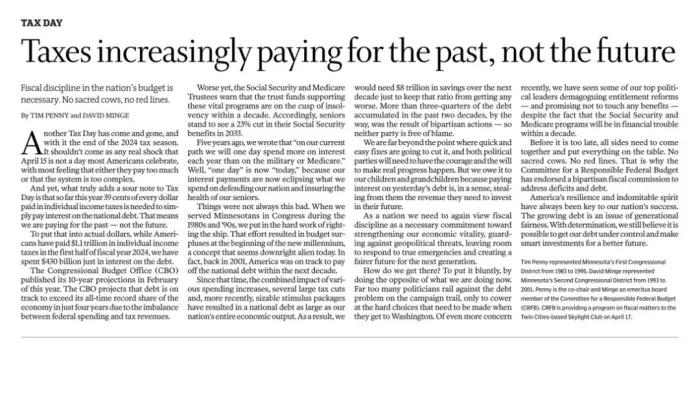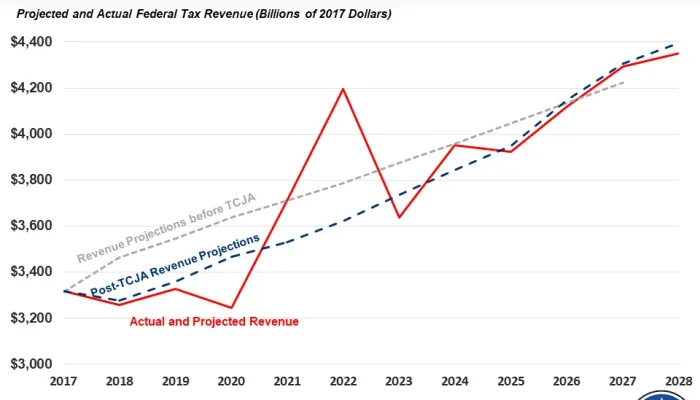Unfinished Business for the New Year
The passage of the Bipartisan Budget Act was a positive move away from governing by crisis, and a demonstration that policymakers can meet self-imposed legislative deadlines. Yet substantial unfinished business remains, and much of it has significant fiscal implications. Below are some issues Congress should address early this year:
- Farm bill: On January 1, the one-year extension of the 2008 farm bill expired, technically reverting farm policy to the 1949 version of the law. Members of the farm bill conference committee say that they are close to a deal, but time is running short. Under the 1949 law, milk prices could rise substantially, and subsidies to different commodities would differ dramatically from last year, although these changes would take time to actually take effect. The farm bills proposed by the House and passed by the Senate would both eliminate direct commodity payments and replace them with a form of shallow loss program (among other changes), saving on net about $15 billion from farm programs. Although they must reconcile a number of differences on farm policy, the biggest sticking point may be on the nutrition side where the House has proposed large reductions in food stamp spending and the Senate only modest change. To buy time, the House has passed a one-month farm bill extension, though it has not been taken up by the Senate. Given the broad bipartisan support for reducing farm subsidies on net, we hope Congress can pass a long-term farm bill which significantly reduces the deficit.
- Unemployment benefits: In late December, the emergency unemployment compensation which was originally passed in 2008 expired. As a result, extended unemployment benefits ended for 1.3 million workers and the maximum number of weeks a person can collect benefits fell from as high as 73 weeks (in Illinois and Nevada) to 26 weeks. (This helpful graphic from the Center on Budget and Policy Priorities offers a state-by-state look at the maximum weeks UI would be collected under an extension.) Many Democrats are pushing hard for a one-year extension, which would cost $25 billion, but it is not clear whether Republicans want an extension or how lawmakers would offset the cost if they did. A bill has also been introduced in the Senate to extend the benefits for three months, at a cost of $6.4 billion. House Speaker John Boehner (R-OH) is reportedly open to an extension as long as the cost is offset and other efforts are taken to encourage job creation. Regardless of how long benefits are extended, CRFB believes the costs must be fully offset.
- Appropriations: The current continuing resolution that funds government expires on January 15. Although the recently-passed Bipartisan Budget Act set the overall discretionary spending limit at $1.012 trillion for FY2014, lawmakers will still have to decide how to appropriate funds within that overall limit. It is likely that Congress will appropriate these funds all at once through an "omnibus" bill rather than 12 different appropriations bills. One option is to pass a continuing resolution which starts with the $986 billion ($518 billion for defense and $468 billion for non-defense) currently appropriated and either pluses up spending uniformly (to reach $520 billion for defense and $492 billion for non-defense) or identifies specific areas to allocate the $26 billion of additional funds, mostly in non-defense spending. A better option would be to make specific decisions in each account by eliminating or reducing low-priority spending while reducing or reversing the sequester-imposed cuts to high-priority spending. Appropriators are currently working on an omnibus package, but it's not clear how much shuffling of funds they will do, or whether they will have the bill ready by January 15.
- Debt ceiling: The bill that ended the government shutdown suspended the debt limit through February 7. With extraodinary measures, Treasury Secretary Jack Lew expects that lawmakers will need to raise the debt ceiling by late February to mid-March, a timeline that the Bipartisan Policy Center agrees with and which is within the broader range suggested by CBO. As we've explained before, policymakers must absolutely raise (or suspend) the debt ceiling to avoid defaulting on our obligations, but discussions over the debt limit can offer an opportunity to take stock of and offer improvements to our fiscal situation.
- Medicare doc fix: A three-month "doc fix" was passed at the end of the year to temporarily avoid a 24 percent cut in Medicare physician payments called for under the Sustainable Growth Rate. By the end of the March, policymakers will need to take further action to avoid these cuts. Extending this "doc fix" through the end of 2014 would cost another $10-15 billion, and if policymakers pursue this extension they must offset the costs, preferably with other health reforms. But rather than pass a one-year doc fix, lawmakers should permanently replace the Sustainable Growth Rate with a new payment formula the rewards doctors based on quality instead of quantity, encourages new payment models, and helps to slow health care cost growth. Efforts are already underway in both the House and Senate to enact such a formula. But doing so will likely cost between $110 billion and $150 billion. Congress will have to identify additional health reforms to cover these costs and should go further to provide some deficit reduction along the way.
- Tax extenders: 55 temporary tax breaks expired at the end of 2013, most of which are regularly extended from year to year. Among the normal tax extenders include the research & experimentation tax credit, the wind production tax credit, the state and local sales tax deduction, and the Subpart F exemption for active financing income. Temporary "bonus depreciation" rules were also allowed to expire. Although these tax extenders are already expired, they can be reinstated retroactively; for example, the extension for 2012 was not passed into law until January 2013. Extending all of them for a year is likely to cost about $40 billion, though Congress should carefully review the extenders to identify which ones can be reformed and which should be allowed to expire. Whatever extenders are continued must be fully paid for so as not to add to the deficit.
We hope 2014 is the year that Congress passes comprehensive tax reform, identifies ways to dramatically slow the growth of health care spending, and makes Social Security sustainably solvent. But even if none of these occur, there is still much to do on the fiscal front. Policymakers must address the coming fiscal speed bumps in a fiscally responsible way, and then work toward putting the debt on a sustainable path.


